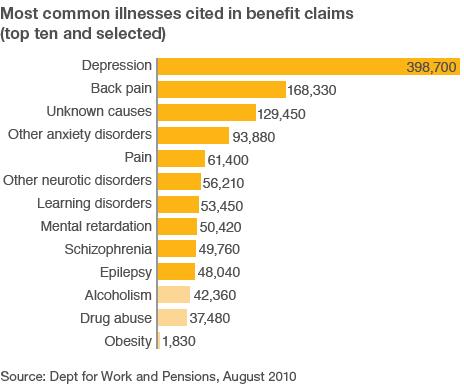PM vows action to get addicts on benefits into work
- Published
Mr Cameron said many people 'had been left for dead' by the last government
People on benefits due to drink and drug problems will be expected to work if they can, David Cameron has said.
He promised "tough action" after government figures showed 80,000 people claimed incapacity benefits due to drink, drug or weight-related issues.
While it was wrong to leave people "trapped in long-term poverty", those unable to work would be supported.
Labour said they backed efforts to get people off benefits but it was a "waste of time" if there were not enough jobs.
The government wants to re-assess all current incapacity benefit claimants by 2014, including the 81,670 people claiming the allowance as a result of health problems stemming from alcohol, drug and obesity conditions.
According to figures released by the DWP, external on Thursday, in August 2010 there were 42,360 claimants with alcohol addiction, 37,480 with drug dependency and 1,800 who were obese.
'Left for dead'
The prime minister denied the government was stigmatising people who were genuinely ill but said the public believed recipients should be "people who are incapacitated through no fault of their own".
"Of course someone who has a drink or drug problem has a problem," he told the BBC. "But is it OK to leave these people on incapacity benefit, year after year, not examining their circumstances, not seeing if we can help them?"
"It traps people in long-term poverty and it is not good enough."
Mr Cameron said the government was showing "courage" to re-examine all existing incapacity benefit claims, suggesting recipients had been "left for dead" by the last government, and those not entitled to the payments would have them removed.
"It is absolutely not just tough talk, it is tough action," he added.
"There are many in our country who can't work, who are incapacitated and as a compassionate country we should help them.

"There are many others who, with help, could work and we should help them.
"But there are some who are on these benefits who do not deserve them and frankly we are not doing our job looking after taxpayers' money if we do not try and make sure these people go to work."
'Workplace stress'
Pilot projects have taken place to determine whether people are fit to work immediately, whether they can begin the process of looking for work with support or whether they need constant care and cannot work.
Alcohol awareness campaigners welcomed the aim of helping people to give up drink and get back to work but warned removing benefits from vulnerable people risked making their situation worse.
Don Shenker, chief executive of Alcohol Concern, said he was concerned the government was not prepared to commit enough funds to tackle a shortage of treatment facilities for those with addictions.
And he told the BBC: "I would imagine that the vast majority would find it quite difficult to go back into the workplace because, first of all, how many employers would take on someone who's been out of work for two or three years because they've been drinking?
"Secondly, the very stressful nature of being in the workplace environment means that for people who are heavily dependent on alcohol it would be difficult for some people to hold down a job."
Employment minister Chris Grayling said private and voluntary organisations had agreed to invest £580m in treating addicts and preparing them for employment, adding that all of the conditions were treatable if people received the right support.
But disability charity Scope said "stereotyping" IB claimants won't help them find work.
"The government has to stop over-simplifying welfare," it said. "It needs to acknowledge that disabled people face multiple, complex barriers to finding jobs and build an assessment and support system based in reality."
Jobs shortage
Shadow Employment Minister Stephen Timms said "a lot of people" would agree with Mr Cameron's argument that IB benefits should be paid to those incapacitated "through no fault of their own".
Stephen Timms: "The government needs to do a great deal more to make sure there are jobs for people to move into"
But he said it was "misleading" to suggest Labour had done nothing to address the problem while it was in power since it had introduced the "fitness to work" test for claimants now being used.
"What the current government is doing is going through a process we established," he said.
"The problem is, at the moment, there are just not enough jobs available. The government's policy is reducing the number of jobs and so for too many people who come off [incapacity] benefit, they are simply going to go onto jobseeker's allowance instead and nobody benefits from that at all.
"I hope they succeed in getting people off benefit but there needs to be jobs for people to go into or, otherwise, this is really a bit of a waste of time."
Ministers launched what they said was the largest back-to-work programme in modern history earlier this month as part of reforms designed to make work pay and simplify the benefits system.
- Published14 February 2011
- Published4 April 2011
- Published4 April 2011